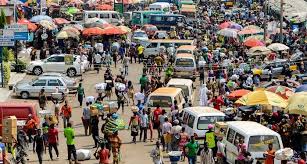
Ghana faces a sobering economic crossroads, with the World Bank warning that without urgent structural reforms, the country risks remaining trapped in low-growth stagnation until after 2050.
The cautionary assessment comes despite recent encouraging signs of recovery, including 5.7% growth in 2024 and 5.3% in the first quarter of 2025.
The World Bank’s latest report, “Transforming Ghana in a Generation,” launched in Accra, highlights that sustained per capita growth of just 3.8% could delay Ghana’s ascent to upper-middle-income status by decades and leave millions mired in persistent poverty.
Ghana’s economic history, marked by recurring crises and heavy reliance on the International Monetary Fund, underlines the urgency of reform.
Since independence, the country has entered 17 IMF programs and spent nearly 40 of the past 68 years under Fund support, reflecting repeated boom-and-bust cycles that have prevented lasting development.
The Bank identifies deep structural challenges, including weak fiscal discipline, inefficient public spending, overreliance on natural resources, and chronically low productivity.
These weaknesses contributed to the 2022 macroeconomic crisis that forced emergency IMF support and continue to hinder sustainable growth.
“Despite recent resilience, gains remain fragile without fundamental policy overhauls,” the report notes.
Nearly 500,000 young Ghanaians enter the labor market annually, yet most opportunities are concentrated in the informal sector, while average earnings have stagnated at around $2,200 per capita for over a decade.
The report offers a hopeful scenario: through strategic investments in education, skills development, and comprehensive reforms, Ghana could sustain 6.5% annual growth, tripling per capita income to $6,600 by 2050. Achieving this would require unprecedented political will and citizen engagement.
Fiscal improvements provide some optimism.
The government aims for a 3.1% deficit and a 1.5% primary surplus in 2025, while inflation has eased from 23% in 2024 to 18.4% by mid-2025.
Yet socioeconomic disparities, regional inequalities, and vulnerabilities in energy and cocoa sectors remain unaddressed, leaving the economy exposed to shocks.
The World Bank stresses that technical reforms alone are insufficient.
Political credibility, institutional strengthening, and citizen trust will be decisive in whether Ghana avoids the middle-income trap and joins the ranks of successful emerging economies.



